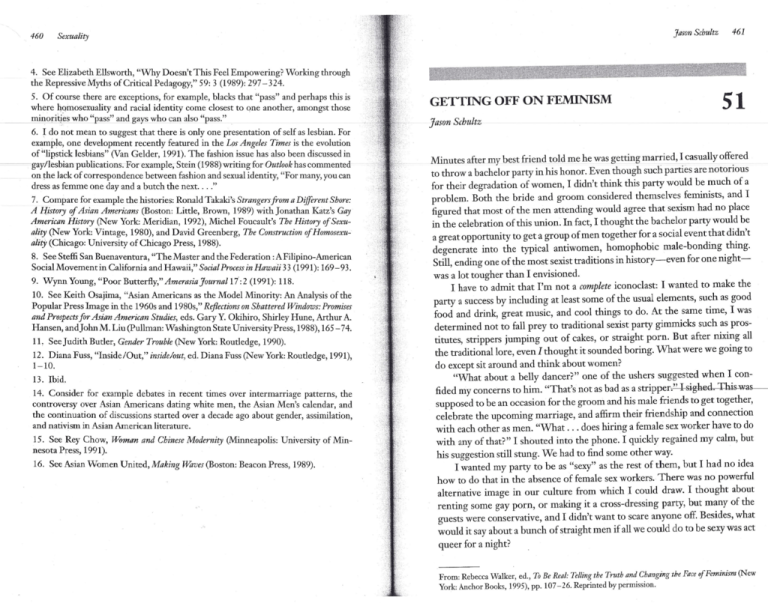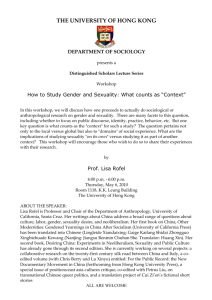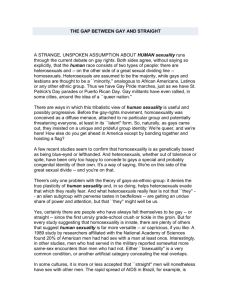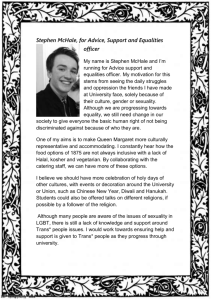
460
Jason Schultz
Sexuality
461
4. See Elizabeth Ellsworth, "Why Doesn't This Feel Empowering? Working through
the Repressive Myths of Critical Pedagogy," 59: 3 (1989): 297-324.
5. Of course there are exceptions, for example, blacks that "pass" and perhaps this is
where homosexuality and racial identity come closest to one another, amongst those
minorities who "pass" and gays who can also "pass."
6. I do not mean to suggest that there is only one presentation of self as lesbian. For
example, one development recently featured in the Los Angeles Times is the evolution
of "lipstick lesbians" (Van Gelder, 1991). The fashion issue has also been discussed in
---gay/lesbian
publications. For example, Stein (1988) writing for Outlook has commented
on the lack of correspondence between fashion and sexual identity, "For many, you can
dress as femme one day and a butch the next .... "
7. Compare for example the histories: Ronald Takaki's Strangers from a Different Shore:
A History of Asian Americans (Boston: Little, Brown, 1989) with Jonathan Katz's Gay
American History (New York: Meridian, 1992), Michel Foucault's The History of Sexuality (New York: Vintage, 1980), and David Greenberg, The Construction of Homosexuality (Chicago: University of Chicago Press, 1988).
8. See Steffi San Buenaventura, "The Master and the Federation: A Filipino-American
Social Movement in California and Hawaii," Social Processin Hauiaii 33 (1991): 169- 93.
9. Wynn Young, "Poor Butterfly," Amerasia Journal 1t: 2 (1991): 118.
10. See Keith Osajima, "Asian Americans as the Model Minority: An Analysis of the
Popular Press Image in the 1960s and 1980s," Reflections on Shattered Windows: Promises
and Prospectsfor Asian American Studies, eds. Gary Y. Okihiro, Shirley Hune, Arthur A.
Hansen, andJohnM. Liu (Pullman: Washington State University Press, 1988), 165-74.
11, See Judith Butler, Gender Trouble (New York: Routledge, 1990).
12. Diana Fuss, "Inside/Out," inside/out, ed. Diana Fuss (New York: Routledge, 1991),
1-10.
13. Ibid.
14. Consider for example debates in recent times over intermarriage patterns, the
controversy over Asian Americans dating white men, the Asian Men's calendar, and
the continuation of discussions started over a decade ago about gender, assimilation,
and nativism in Asian American literature.
15. See Rey Chow, Woman and Chinese Modernity (Minneapolis: University of Minnesota Press, 1991).
16. See Asian Women United, Making Tfflves (Boston: Beacon Press, 1989).
GETTING OFF ON FEMINISM
51
Jason Schultz
Minutes after my best friend told me he was getting married, I casually offered
to throw a bachelor party in his honor. Even though such parties are notorious
for their degradation of women, I didn't think this party would be much of a
problem. Both the bride and groom considered themselves feminists, and I
figured that most of the men attending would agree that sexism had no place
in the celebration of this union. In fact, I thought the bachelor party would be
a great opportuni ty to get a group of men together for a social event that didn't
degenerate into the typical antiwomen, homophobic male-bonding thing.
Still, ending one of the most sexist traditions in history-even for one nightwas a lot tougher than I envisioned.
I have to admit that I'm not a complete iconoclast: I wanted to make the
party a success by including at least some of the usual elements, such as good
food and drink, great music, and cool things to do. At the same time, I was
determined not to fall prey to traditional sexist party gimmicks such as prostitutes, strippers jumping out of cakes, or straight porn. But after nixing all
the traditional lore, even I thought it sounded boring. What were we going to
do except sit around and think about women?
"What about a belly dancer?" one of the ushers suggested when I confided my concerns to him. "That's not as bad as a stripper;" I sigh@d.This was-supposed to be an occasion for the groom and his male friends to get together,
celebrate the upcoming marriage, and affirm their friendship and connection
with each other as men. "What ... does hiring a female sex worker have to do
with any of that?" I shouted into the phone. I quickly regained my calm, but
his suggestion still stung. We had to find some other way.
I wanted my party to be as "sexy" as the rest of them, but I had no idea
how to do that in the absence of female sex workers. There was no powerful
alternative image in our culture from which I could draw. I thought about
renting some gay porn, or making it a cross-dressing party, but many of the
guests were conservative, and I didn't want to scare anyone off. Besides, what
would it say about a bunch of straight men if all we could do to be sexywas act
queer for a night?
From: Rebecca Walker, ed., To Be Real: Telling the Trutb and Changing the Face QfFeminism (New
York: Anchor Books, 1995), pp. 107 -26. Reprinted
by permission.
___
Over coffee on a Sunday morning, I asked some of the other guys what
they thought was so "sexy" about having a stripper at a bachelor party.
"Well," David said, "it's just a gag. It's something kinda funny and sexy at
the same time."
"Yeah," A.J. agreed. "It's not all that serious, but it's something special to
do that makes the party cool."
"But why is it sexy and funny?" I asked. "Why can't we, as a bunch of
guys, be s~_and funny ourselves?"
"'Cause it's easier to be a guy with other guys when there's a chick
around. It gives you all something in common to relate to."
"Hmm. I think I know what you mean," I said. "When I see a stripper, I
get turned on, but not in the same way I would if I was with a lover. It's more
like going to a show or watching a flick together. It's enjoyable, stimulating,
but it's not overwhelming or intimate in the same way that sex is. Having the
stripper provides a common emotional context for us to feel turned on. But
we don't have to do anything about it like we would if we were with a girlfriend, right?"
"Well, my girlfriend would kill me if she saw me checking out this stripper," Greg replied. "But because it's kind of a male-bonding thing, it's not as
threatening to our relationship. It's not because it's the stripper over her, it's
because it's just us guys hanging out. It doesn't go past that."
Others agreed. "Yeah. You get turned on, but not in a serious way. It
makes you feel sexy and sexual, and you can enjoy feeling that way with your
friends. Otherwise, a lot of times, just hanging out with the guys is pretty
boring. Especially at a bachelor party. I mean, that's the whole point, isn't itto celebrate the fact that we're bachelors, and he "-referring to Robert, the
groom-"isn't!"
Through these conversations, I realized that having a female sex worker
at the party would give the men permission to connect with one another without becoming vulnerable. When men discuss sex in terms of actions-who
they "did," and how and where they did it-they can gain recognition and
validation of their sexuality from other men without having to expose their
feelings about sex.
"What other kinds of things make you feel sexy like the stripper does?" I
asked several of the guys.
"Watching porn sometimes, or a sexy movie."
A.]. said, "Just getting a look from a girl at a club. I mean, she doesn't even
have to talk to you, but you still feel sexy and you can still hang out with your
friends."
Greg added, "Sometimes just knowing that my girlfriend thinks I'm sexy,
and then talking about her with friends, makes me feel like I'm the man. Or
I'll hear some other guy talk about his girlfriend in a way that reminds me of
mine, and I'll still get that same feeling. But that doesn't happen very often,
and usually only when talking with one other guy.
This gave me an idea. "I've noticed that same thing, both here and at
school with my other close guy friends. Why doesn't it happen with a bunch
of guys, say at a party?"
"I don't know. It's hard to share a lot of personal stuff with guys," said
Adam, "especially about someone you're seeing, if you don't feel comfortable.
Well, not comfortable, because I know most of the guys who'll be at the party,
but it's more like I don't want them to hassle me, or I might say something
that freaks them out."
I~
1'1'
-)
:iI'
:
:I(
~'
,
...:;:-;11I"
-~
''<It.
'lJ~
-{
"Or you're just used to guys talking shit about girls," someone else added.
"Like at a party or hanging out together. They rag on them, or pick out who's
the cutest or who wants to do who. That's not the same thing as really talking
about what makes you feel sexy."
"Hmm," I said. "So it's kind of like if I were to say that I liked to be tied
down to the bed, no one would take me seriously. You guys would probably
crack up laughing, make a joke or two, but I'd never expect you to actually
join in and talk about being tied up in a serious way. It certainly wouldn't feel
'sexy,' would it? At least not as much as the stripper."
"Exactly. You talking about being tied down here is fine, 'cause we're into
the subject of sex on a serious kick and all. But at a party, people are bullshitting each other and gabbing, and horsing around. The last thing most of us
want is to trip over someone's personal taste or start thinking someone's a little
queer."
"You mean queer as in homosexual?" I asked.
"Well, not really, 'cause I think everyone here is straight. But more of
queer in the sense of perverted or different. I mean, you grow up in high
, school thinking that all guys are basically the same. You all want the same
thing from girls in the same way. And when someone like you says you like to
be tied down, it's kind a weird-almost like a challenge. It makes me have to
respond in a way that either shows me agreeing that I also like to be tied down
or not. And if someone's a typical guy and he says that, it makes you think he's
different-not the same guy you knew in high school. And if he's not the same
guy, then it challenges you to relate to him on a different level."
"Yeah, I guess in some ways it's like relating to someone who's gay," Greg
said. "He can be cool and all, and you can get along totally great. But there's
this barrier that's hard to cross over. It kinda keeps you apart. And that's not
what you want to feel toward your friends, especially at a party like this one,
where you're all coming together to chill."
As the bachelor party approached, I found myself wondering whether my
friends and I could "come together to chilI"-and affirm our status as sexual
straight men-without buying into homophobic or sexist expressions. At the
same time, I was doing a lot of soul-searching on how we could challenge the
dominant culture's vision of male heterosexuality, not only by deciding against
having a stripper at our party, but also by examining and redefining our own
relationships with women.
..
~I,
j~.'
SEX AND THE SENSITIVE MAN
____
A"-"ccording
to the prevailing cultural view, "desirable" hetero men are inherently dominant, aggressive, and, in many subtle and overt ways, abusive to
women. To be sexy and powerful, straight men are expected to control and
contrive a sexuality that reinforces their authority. Opposing these notions of
_----power subjects a straight guy to being branded "sensitive," submissive, or passive-banished to the nether regions of excitement and pleasure, the unmasculine, asexual, "vanilla" purgatory of antieroticism. Just as hetero women are
often forced to choose between the images of the virgin and the whore, modern straight men are caught in a cultural tug-of-war between the Marlboro
Man So
and
the Wimp.
where
does that leave straight men who want to reexamine what a man
is and change it? Can a good man be sexy? Can a sexy man be good? What is
en
good sex, egalitarian sex? More fundamentally, can ferninistwom
and men
coexist comfortably, even happily, within the same theoretical framework-or
the same
bedroom?with men remain one of the most controversial topics among
Relationships
feminists today. Having sex, negotiating emotional dependency, andlor raising children force many hetero couples to balance their desire to be together
with the oppressive dynamics of sexism. In few other movements are the oppressor group and the oppressed group so intimately linked.
But what about men who support feminism? Shouldn't it be okay for
straight feminist women to have sex with them? Straight men aren't always
oppressive in their sexuality, are they?
You may laugh at these questions, but they hold serious implications for
straight feminist sex. I've seen many relationships between opposite-sex activists self-destruct because critical assumptions about power dynamics and desires were made in the mind, but not in the bed. I've even been told that
straight male feminists can't get laid without (A) feeling guilty; (B) reinforcing
patriarchy; or (C) maintaining complete passivity during sexual activity. Each
of these three options represents common assumptions about the sexuality of
straight men who support feminism. Choice A, "feeling guilty," reflects the
beJief that straight male desire inherently contradicts the goals of feminism
and fails to contribute to the empowerment of women. It holds that any man
;at
who enjoys sex with a woman must be benefiting from sexist male privilege,
not fighting against it. In other words, het sex becomes a zero-sum game
where if men gain, feminism loses.
Choice B represents the assumption that hetero male sex is inherently
patriarchal. Beyond merely being of no help, as in Choice A, straight male
sexuality is seen as part of the problem. Within this theory, one often hears
statements such as "all heterosexual sex is rape." Even though these statements are usually taken out of context, the ideas behind them are problematic ..
In essence, they say that you can never have a male/female interaction that
isn't caught up in oppressive dynamics. Men and women can never be together, especially in such a vulnerable exchange as sexuality, without being
subject to the misdistribution of power in society,
The third choice, "maintaining complete passivity," attempts a logical answer to the above predicament. In order to come even close to achieving
equality in heterosexuality (and still get laid), men must "give up" all their
power through inactivity. A truly feminist m~p.should take no aggressive or
dominant position. He should, in fact, not act at all; he should merely lie back
and allow the woman to subvert male supremacy through her complete control of the situation. In other words, for a man and a woman to share sexuality
on a "level playing field," the man must remove all symptoms of his power
through passivity, even though the causes of t.ql!tinequality (including his penis!) still exist....
Does it have to be this way? Must male heterosexuality always pose a
threat to feminism? What about the sensitive guy? Wasn't that the male cry
(whimper) of the nineties? Sorry, but all the media hype about sensitivity
never added up to significant changes in behavior. Straight male sexuality still
remains one of the most underchallenged areas of masculinity in America.
Some men did propose t different kind of sexuality for straight men in the
1970s, one that emphasizes feelings and sensitivity and emotional connection.
But these efforts failed to affect our ideas in any kind of revolutionary way.
Now, instead of a "sexy" sensitive guy, m~n's magazines are calling for the
emergence of the "Post-Sensitive Man," while scientific studies tell us that
women prefer Clint Eastwood over Michael Bolton.
Why did sensitivity fail? Were straight women, even feminists, lying to
men about what they wanted? The answer is "yes" and "no." I don't think:
sensitivity was the culprit. I think the problem was men's passivity, or more
specifically,men's lack of assertiveness and power.
In much of our understanding, power is equated with oppression: images
of white supremacists dominating people of color, men dominating women,
and the rich dominating the poor underline the histories of many cultures and
societies. But power need not always oppress others. One can, I believe, be
powerful in a non oppressive way.
In order to find this sort of alternative, we need to examine men's experience with power and sexuality further. Fortunately, queer men and women
have given us a leg up on the process by reenergizing the debate about what is
good sex and what is fair sex. Gay male culture has a long history of exploring
nontraditional aspects of male sexuality, such as cross-dressing, bondage and
dominance, and role playing. These dynamics force gay men to break out of a
singular experience of male sexual desire and to examine the diversity within
male sexuality in the absence of gender oppression. Though gay men's culture
still struggles with issues such as the fetishizing of men of color and body
fascism, it does invite greater exploration of diversity than straight male culture. Gay culture has broader and more inclusive attitudes about what is sexy
and a conception of desire that accommodates many types of sex for many
types of gay men. For straight men in our culture, there is such a rigid definition of "sexy" that it leaves us few options besides being oppressive, overbearing, or violent.
Part of the success that gay male culture enjoys in breaking out of monolithic notions of male sexuality lies in the acceptance it receives from its partners and peers. Camp, butch, leather, drag-queer culture is constantlyaffirming the powerful presence of alternative sexualities. Straight male culture, on
the other hand, experiences a lack-a void of acceptance-whenever it tries
to assert some image other than the sexist hetero male. Both publicly and in
many cases privately, alternative straight male sexualities fail to compete for
attention and acceptance among hetero men and women ....
We need to assert a new feminist sexuality for men, one that competes
with the traditional paradigm but offers a more inviting notion of how hetero
men can be sexual while tearing apart the oppressive and problematic ways in
which so many of us have experienced sexuality in the past. We need to find
new, strong values and ideas of male heterosexuality instead of passive identifies that try to distance us from sexist men. We need to stop trying to avoid
powerful straight sexuality and work to redefine what our power means and
does. We need to find strength and desire outside of macho, antiwomen ways
of being masculine ....
Gay men and lesbians have engaged in a cultural dialogue around sexuality over the last twenty-five years; straight women are becoming more and
more vocal. But straight men have been almost completely silent. This silence,
I think, stems in large part from fear: our cultures tell us that being a "real"
man means not being feminine, not being gay, and not being weak. Theywarn
us that anyone who dares to stand up to these ideas becomes a sitting target to
have his manhood shot down in flames.
BREAKING THE SILENCE
Not beCominga Sitting target to have my manhood shot down was high on my
mind when the evening of my best friend's bachelor party finally arrived. But
I was determined not to be silent about how I felt about the party and about
new visions for straight men within Oursociety.
We decided to throw the party two nights before the wedding. We all
gathered at my house, each of us bringing ~ present to add to the night's activities. After all the men had arrived, we began cooking dinner, breaking open
beer
and other.
champagne, and catching up on where we had left off since we last
saw each
'liS.
·r.:
~<:...
·,It.-
5f
During the evening, we continued to talk off and on about why we didn't
have a stripper or prostitute for the party. After several rounds of margaritas
and a few hands of poker, tension started to build around the direction I was
pushing the conversation.
"So what don't you like about strippers?" David asked me.
This was an interesting question. I was surprised not only by the guts of
David to ask it, but also by my own mixed feelings in cOming up with an answer. "It's not that I don't like being excited, or turned on, per se," I responded. "In fact, to be honest, watching a female stripper is an exciting and
erotic experience for me. But at the same time, it's a very uncomfortable one.
I getmakes
a sensesense."
when I watch her that I'm participating in a misuse of pleasure, if
that
I looked around at my friends. I Couldn't tell whether the confused looks
on their faces were due to the alcohol, the poker game, or my answer, so I
continued. "Ideally, I would love to sit back and enjoy watching someone express herself sexually through dance, seduction, flirtation_all the positive
elements I associate with stripping," I said. "But at the same time, because so
many strippers are poor and forced to perform in order to Survive economi_
cally,I feel like the turn-on I get is false. I feel like I get off easy, sitting back
as the man, paying for the show. No one ever expects me to get up on stage.
"And in that way, it's selling myself short sexually.It's not only saying very
little about the sexual worth of the woman on stage, but the sexual worth of
me as the viewer as well. By only being a viewer-just getting off as a member
of the audience_the striptease becomes a very limiting thing, an imbalanced
dynamic. If the purpose is for me to feel sexy and excited, but not to act on
those feelings, I'd rather find a more honest and direct way.to do it. So personally, while I would enjoy watching a stripper on one level, the real issues of
economics, the treatment of women, and the limitation of my own sexual personae push me to reject the whole stripper thing in favor of something else."
"But Whatelse do you do to feel sexy?" A.]. asked.
"That's a tough question," I said. "Feeling sexy often depends on the way
other people act toward you. For me, right now, you guys are a huge way for
me to feel sexy. [Some of the men cringe.] I'm not saying that we have to challenge our sexual identities, although that's one way. But we can cut through a
lot of this locker-room macho crap and start talking with each other about
how we feel sexually, what we think, what we like, etc. Watching the stripper
makes us feel sexy because we get turned on through the dynamic between
her performance and our voyeurism. We can find that same erotic connection
with each other by re-creating that context between us. In such a case, we're
still heterosexual-we're no more having sex with each other than we are with
the stripper. But we're not relying on the imbalanced dynamic of sex work to
feel pleasure as straight men." ...
The guys were silent for a few seconds, but soon afterwards, the ice
seemed to break. ... They agreed that, as heterosexual men, we should be able
to share with each other what we find exciting and shouldn't need a female
stripper to feel sexy. In some ways it may have been the desire to define their
own sexuality that changed their minds; in others it may have been a traditionally masculine desire to reject any dependency on women. In any case, other
men began to speak of their own experiences with pleasure and desire, and we
continued to talk throughout the night, exploring the joys of hot sex, onenight stands, and even our preferences for certain brands of condoms. We
discussed the ups and down of monogamy versus" open" dating and the pains
of long-distance relationships.
Some men continued to talk openly about their desire for straight pornography or women who fit the traditional stereotype of feminity. But others
contradicted this, expressing their wish to move beyond that image of women
in their lives. The wedding, which started out as the circumstance for our
gathering, soon fell into the background of our thoughts as we focused away
from institutional ideas of breeder sexuality and began to find common ground
through our real-life experiences and feelings as straight men. In the end, we
all toasted the groom, sharing stories, jokes, and parts of our lives that many
of us had never told. Most importantly, we were able to expressourselves sexually without hiding who we were from each other.
Thinking back on the party, I realized that the hard part was figuring out
what we all wanted and how to construct a different way of finding that experience. The other men there wanted it just as much as I did. The problem was
that we had no ideas of what a different kind of bachelor party mightlook like.
Merely eliminating the old ways of relating (i.e., the female sex workers) left a
gap, an empty space which in many waysfelt worse than the sexist connection
that existed there before; we felt passive and powerless. Yet we found a new
way of interacting_one
periencing
them.
that embraced new ideas and shared the risk of ex.
Was the party sexy? Did we challenge the dominance of Oppressivemalt
sexuality? Not completely, but it was a start. I doubt anyone found my party
as "sexy" as traditional ones might be, but the dialogue has to start somewhere. It's going to take a while to generate the language and collective tension to balance the cultural image of heterosexual male sexuality with true
sexual diversity. Still, one of my friends from high school-who's generally on
the conservative end of most issues-told me as he was leaving that of all the
bachelor parties he had been to, this was by far the best one. "I had a great
time," he said. "Even without the stripper." ...
When it comes to sex, feminist straight men must become participants in
the discourse about our own sexuality. We have to fight the Oppressiveimages
of men as biological breeders and leering animals. We must find ways in:which
to understand our diverse backgrounds, articulate desires that are not oppressive, and acknowledge the power we hold. We must take center stage when it
comes to articulating our views in a powerful voice. I'm not trying to prescribe
any particular form of sexuality or specify what straight men should want. But
until we begin to generate our own demands and desires in an honest and
equitable way for feminist straight women to hear, I don't think we can expect
to be both good and sexy any time SOon.










